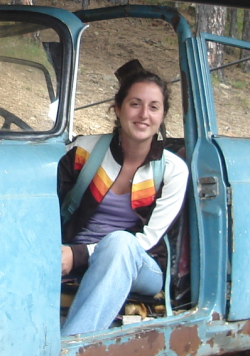Rolf Potts's Blog, page 108
February 9, 2012
Slow Down to Enjoy the Music
Vagablogging :: Rolf Potts Vagabonding Blog
Earlier this week the Indie Travel Manifesto, which had twenty four declarations about independent travel, was posted. One that stood out to me was Slow Down and Enjoy an Experience. After reading them, a particularly intriguing article got me thinking.
If we simply slow down a little, it is truly amazing what we could notice that goes on around us.
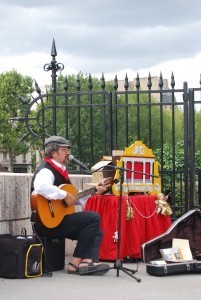
listening to a street musician photo/Lindsey Rue
One example deemed a "social experiment" by The Washington post, staged for a violinist to play intricate classical music for 45 minutes during morning rush hour at a Washington D.C. train station. With cameras rolling and reporters scattered amongst commuters to see how many people would respond to the music, his first attention amazingly came from children. Now for the twist; the violinist (Joshua Bell a Grammy-Award winner) was striking out some of the most complicated tunes on a 17th century violin standing near a trash can. Out of the thousand or so people who passed by, many did not even acknowledge or notice his presence as he played. The masses paused, instead, to plug cash into the nearby lotto machine.
Granted, not everyone is interested in classical music. I wouldn't have recognized him on the spot. I would, however, have slowed down to listen guaranteed! In fact, one time while in front of the Royal Palace in Stockholm, I spontaneous dropped my pack to dance to guitar tunes along a snowy street.
When the group Spiritus Mundi was just beginning I met its founder Henrik Melius. The group who's name means "soul of the world", travels mainly between Sweden and the Middle East to foster "intercultural dialog" by using creative forms of expression like: music, imagery and dance. Melius says, "There is value in intercultural dialogue between countries with great fundamental differences. Is it not more important to create meeting grounds between those who don't think or live the same way? Dialogue is not to agree with one another, it is being a part of change. It is better to loosen knots than to tighten them."
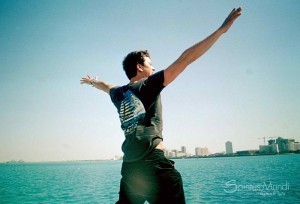
photo/ Spiritus Mundi image gallery (2004)
Music is rooted in every culture and plays a significant role not only within a society but also within ourselves. For you Grateful Dead fans out there; Oliver Sacks wrote an essay called The Last Hippie about a man, who after having brain surgery to remove a tumor, could only recall memories while listening to "Dead" music.
What about you? Have you taken the time to slow down and enjoy some music in your travels?
Original article can be found here: Slow Down to Enjoy the Music
February 8, 2012
Vagabonding Case Study: Heliana Trovato
Vagablogging :: Rolf Potts Vagabonding Blog
Heliana Trovato
Age: 30
Hometown: Buenos Aires, Argentina
Quote: "Don't worry about anything. Never. Things work out for themselves. You just have to be awake, to see the way. It's as simple as that."
How did you find out about Vagabonding, and how did you find it useful before and during the trip?
I found it diving the web. It was not a practical help. I found it useful because in that moment I was really doubting the righteousness of my trip. Like I was almost 30 and no socially correct life… and what happened if I wanted one later on. And I found out that a lot of vagabonds came along the same thing.
How long were you on the road? Almost 2 years.
Where all did you go?
Not so much, really. I consider myself pretty slow to travel. I need time to get to know places… In España: Barcelona and Terrassa… in France: Dijon, Paris and Cannes. Pretty much all Italia, except from Sicilia and Venezia. Deutschland: Düsseldorf, Berlin, Köln. In Serbia: Belgrade, Küstendorf, Guča. Luxembourg.
What was your job or source of travel funding for this journey?
In Buenos Aires, I used to work in producer companies, as a video editor. Before coming here, I was working at 4 places at the same time (including a call center and an office too), slept 4 hours, but could get the money that I needed to come here.
Did you work or volunteer on the road?
I worked in Italia, in a hotel in Puglia. After 3 months of travelling I hadn't had any more money… I found this hotel in Vieste, Puglia and stayed. I consider it barely work. The job was sometimes hard (I loved to make the breakfasts, but hated the cleaning of the rooms) The owner called me at noon and told me to urgently go to her house, and when I arrived there was a plate of pasta waiting for me. Every day I went to the beach, 30 minutes walking from the hotel. The panorama was out of this world. Stayed there for 5 months. And I'm still in touch with my former employers…
After 2 months of travelling, arrived to Deutschland and ran out of money. Again. Got a job in a Cuban restaurant, got an apartment, and stayed… After 3 months, I switched from the restaurant to a call center, where I can speak everything BUT german… and I stayed a little longer.
Of all the places you visited, which was your favorite?
That's very difficult to choose. I have my favorite moments, my magic moments, not places.
In Barcelona I lived for 10 days in a very little apartment, literally above the Plaza Real. I shared it with Samuel, a modern hero photographer.
In Cannes, didn't have a place to sleep, and ended up sleeping in a bungalow with one of the 5 projectionists of the Festival who were staying there. They treated me like their daughter. They didn't speak much English, I didn't speak French. We drank wine, eat cheese, smoked petards, and will have them in my heart forever. In Deutschland, I met a Spanish guy in an airport and ended up staying in his house, with his Bulgarian girlfriend and another girl as well. In Neuss, I had a great welcoming for New Years' with a group of german friends that treated me as a friend who've known for all their lives. I travelled around the world while walking through Köln several times, at night, with a friend of Catalunya. Guča was really special too… 24 hours of music, non stop. In Küstendorf, I met my hero Kusturica and the city was out of a fairy tale.
Was there a place that was your least favorite, or most disappointing, or most challenging?
My least favourites places were the ones I didn't find my place. And I moved on right away.
Did any of your pre-trip worries or concerns come true? Did you run into any problems or obstacles that you hadn't anticipated?
I thought of my trip as a whole different way. It was meant as a Europe trip, and now I've lived in Deutschland for 9 months. I also stayed without moving in Italy for 5, while working in the hotel. I think problems are only opportunities, and I'm glad I ran out of money in Köln, so I got to stay here to know the place and decide to stay a little longer.
Which travel gear proved most useful? Least useful?
With a backpack packed with clothes for 10-15 days, you're set to go. You don't really need anything more to travel. Even less, it's more than ok. I had to pack for winter and summer, that was my problem…
What are the rewards of the vagabonding lifestyle?
Freedom. The way you see things differently. Everything is new and exciting. And awesome. And when you're alone, you meet so many people. And also when you're an alien to where you are, you learn so much about yourself. And you get the feeling you're invincible. You surprise yourself, everyday. That's what happened to me at least. I find me being proud of myself so often…
What are the challenges and sacrifices of the vagabonding lifestyle?
As you know a lot of people along the road, they or you are just passing by, and saying goodbye so often is sometimes hard. Also, it's difficult to say which life is yours. This one, or the steady one. Sometimes it's hard to see that you are the same person.
What lessons did you learn on the road?
I said that in the rewards part.
How did your personal definition of "vagabonding" develop over the course of the trip?
I stopped the travelling and stayed in a place for a year. And yet, it still feels like vagabonding. Because I feel this is not really my home, my place, and I get the feeling I'm still moving, even though I'm not. And that's a wonderful feeling.
If there was one thing you could have told yourself before the trip, what would it be?
Don't worry about anything. Never. Things work out for themselves. You just have to be awake, to see the way. It's as simple as that.
Any advice or tips for someone hoping to embark on a similar adventure?
Leave, NOW.
When and where do you think you'll take your next long-term journey?
Don't plan to end this one yet. But maybe some place warmer…
Are you a Vagabonding reader planning, in the middle of, or returning from a journey? Would you like your travel blog or website to be featured on Vagabonding Case Studies? If so, drop us a line at casestudies@vagabonding.net and tell us a little about yourself.
Original article can be found here: Vagabonding Case Study: Heliana Trovato
Preparing for the unexpected responses to your travel news
Vagablogging :: Rolf Potts Vagabonding Blog
As I've made final preparations for my backpacking trip the past few months, I've come to realize there was one thing I completely underestimated: The act of telling people of my plans and dealing with their reactions is much more time-consuming and emotionally exhausting than expected.
Even more surprising was that this happened in different ways than I'd anticipated – the reactions I imagined actually never came true, and the reactions I never expected happened on repeat.
I'd expect this to be the case for many others who are planning their first trip, so I'll share my experience in hopes of helping you be better prepared:
What I thought vs. what happened:
Everyone will think I'm crazy. This was the number one thing I worried about. I thought people would think I was going through some life crisis, or having a break down. But nobody thought this, and instead, the most overwhelming response I've received was that people admire me for following my dream and are inspired.
They won't understand "wanderlust" because they don't have it. They get it. In fact, many of them will tell you about their friend or family member who did something similar, and how cool they think it is, and how they wish they could do it.
I'm going to be lectured on the poor economy and this being a terrible time to quit my job. I did get a couple off-hand comments about this, but for the most part, people responded with things like, "If you're going to do something like this, now's the time" and "A job's a job – there will be more waiting when you get back."
What I didn't expect, but constantly happened:
People were afraid for my safety. As I mentioned in my post last week, I was prepared to respond to the safety concerns of others, but I wasn't prepared for that to be the number one response I'd hear from every single family member – complete with horrified looks on their faces. I wasn't prepared for people to refer me to articles such as the most dangerous cities in the world, or for people to take it upon themselves to research safety for me (as if I hadn't already done so myself).
People were shocked that I'd only be bringing a backpack. In fact, a couple of my friends asked if I'd be shipping my belongings in advance. A coworker who'd just returned from a 5-day vacation with a huge suitcase was speechless. Another coworker was fascinated by the foreseen freedom that comes from such limited belongings. I've received about a half dozen requests for my packing list.
People were amazed that I'd be going alone. It's important to remember that most people are used to going on "vacations" with other people. The idea of a 29-year-old woman traveling through Latin America alone can be extremely appalling to them. I've learned to explain that in the backpacking world this is quite common, and that I'll meet other travelers and volunteers along the way.
A conclusion I've made is to remember that people who don't travel often or have the desire for a traveling lifestyle haven't read the hundreds of blogs and half-dozen books that I've read, nor been exposed to the huge online community of people who do this every day – and it's not their fault. So it's important to be prepared to explain it to them, and when you do, you'll find that most people are much more understanding and accepting than you might expect.
I've always been one to care too much about what other people think, but this process has helped me realize it's not worth worrying about. People who know you and care about you will support you. And as long as you're confident in your decision, that's the only opinion that matters.
Original article can be found here: Preparing for the unexpected responses to your travel news
February 7, 2012
Street children: do tourist dollars help or hurt?
Vagablogging :: Rolf Potts Vagabonding Blog
Three kids recently asked if they could sing a song for me outside of Phnom Penh's National Museum. They were between five and ten years old, barefoot, and covered in dirt.
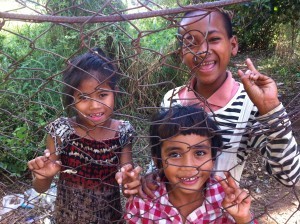
How can you say no to this?
Baffled, I obliged. They sang an adorable (and broken) version of a Sean Kingston song before breaking out into a more original number, pleading in unison for money to spend on food and school. Their bursting giggles turned to murmurs of desperation and they rubbed their bellies to show me their hunger. I gave them a dollar and my bottle of water, and they were quickly back to giggles before running away.
My new friends worked Sean Kingston into their act, but street children have many ways of asking for money and it's often difficult to say no.
One brave girl latched onto my arm at Angkor Wat, tugging my bag and yelling, "I want money and I want a meal!" I said "maybe later" and kept walking, but not without a guilty conscience. She let me know that that "maybe later" means "yes" in Cambodia. Sure enough, she reappeared a few hours later to ask again.
Visit tourist areas all over the world and you'll likely have a similar experience. You'll see kids tapping on taxi windows in India, and begging women holding sleeping infants in Bangkok. With scenes like this all over developing countries, when, if ever, is it best to give?
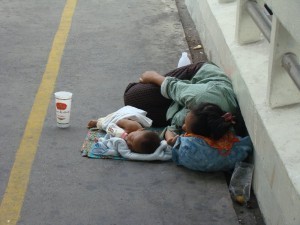
Typical scene along the Bangkok Skytrain- photo from photographyofthailand.com
Taking a cue from the ChildSafe organization in Sihanoukville, Cambodia, I learn that our money actually does more harm than good.
A begging six year old girl can often earn more money per day than her parents, making her a necessary income source for the family. The more handouts she gets, the more appealing it becomes to continue living as a beggar. If she can make a good living on the streets, why go to school? These children are exposed to sexual exploitation (most often in the form of child prostitution) and drugs, either for themselves or for their parents or "beggar masters." Cambodia has one of the highest rates of child solvent addiction, and tourist dollars continue to support these habits. Many kids remain beggars for the rest of their lives.
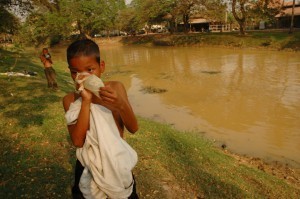
A Cambodian child sniffing glue - photo from eyeofzann
Next time you see a child with outstretched arms, no matter how adorable, think about the power of your dollar. Give your money instead to organizations that are trained to help break the cycle of street begging. Below are a few exceptional charities!
Friends International
Street Friends
Think Before Giving
Save The Children
Original article can be found here: Street children: do tourist dollars help or hurt?
Travel is good for kids
Vagablogging :: Rolf Potts Vagabonding Blog
Many parents feel their adventurous days are over as soon as Junior enters their lives. Once you're a parent, suddenly you've got to toe the line, live like everybody else, and do the responsible thing, right? Right?
Maybe not.

Kids learn to be flexible while traveling
There are plenty of reasons why travel is good for kids. Whether you are traveling for a two-week vacation or heading out for a multi-year vagabonding lifestyle, travel is good.
Travel helps kids learn the world is a wonderful place. In today's society where most people fear others, travel helps children learn that the vast majority of people in our world are kind and generous people who will go the extra mile to help a fellow human.
Travel helps kids develop communication skills. As they travel amongst various cultures, they'll communicate with people of all ages and in many languages. Children will pick up foreign languages and perfect the fine art of sign language when they can't get their message across with words.
Travel broadens kids' education. There's nothing like being a place to learn about that place. The history and culture come alive when you see it being lived. Textbooks are great resources, but don't come close to replicating the experience of actually being there and being able to see, hear, smell, taste, and touch it.
Travel helps kids become more flexible and to adapt to changes easier. We all know the old adage that even the best laid plans will go awry. While traveling, plans change daily – minute by minute at times – and kids need to adapt. Through those experiences they learn that things will be OK, even if they aren't what was expected.
Original article can be found here: Travel is good for kids
February 6, 2012
A journey's bookends: anticipation and reminiscence
Vagablogging :: Rolf Potts Vagabonding Blog

Well," said Pooh, "what I like best," and then he had to stop and think. Because although eating honey was a very good thing to do, there was a moment just before you began to eat it which was better than when you were
, but he didn't know what it was called."
–A.A. Milne
Anticipation and reminiscence are two often overlooked aspects of our travels – the forgotten bookends our of journeys. It's easy to forget, in our haste and excitement, that the dreaming and scheming, as well as remembering, is as much a part of travel as is the actual experience. I recall being in my mid-20′s and spending hours researching (read: romanticizing) my new Korean home and the ESL position I was soon to take. Daydreaming about the land of the morning calm was just as potent an antidote to the day-to-day banality I felt I was drudging through as was the eventual time I spent living there. The pre-departure habits I developed evolved into the rituals that I still observe today. Xe.com for currency rates. The U.S. State department for warnings (often unheeded) and national background information. Various language resources to make the inevitable linguistic awkwardness less so upon arrival. And, of course, using seasonal weather reports to inform my clothing choices. I looked at scores of photos and read voraciously on the history and culture and foods and language. The mounting excitement I felt in the weeks leading up to my departure and the release I experienced when finally boarding that plane…that was as important as the months I spent toiling and exploring the tiny Korean peninsula.
And, on the other end, we have the return. Coming home with outlandish tales of newfound amateur immigrant status and narrowly averted debacles. Stories of food markets, raw fish, majestic sunsets, vulgar rubbish piles and soju soaked Saturdays. In sharing our experiences we're, in no small way, reliving our travels. We subject friends and family to photos that will always mean more to us. Paul Theroux can be quoted, "Travel is only glamorous in retrospect.", yet I'd disagree with him and say that we need to recall our trials and travails as well as our triumphs for this allows us to view our experiences as a whole and not in some reductive, simplified manner. Returning home calls for an honest nostalgia, if not for posterity's sake, then simply to better appreciate the good times. And how can we begin to appreciate the bitter without the sweet?
I'll leave you with a case in point: Homer's 8th century classic, "Odyssey" is compromised of 24 books, yet the journey itself is a mere 4 volumes long (1/6 or 16.67% for the mathematically inclined). What's in the other 20 books you ask (aka the bulk of the Odyssey)? That's the build-up, the anticipation, the planning, the return; that's life happening. The takeaway is that traveling doesn't start when we set down "in-country" anymore than it ends when we board the final plane home. The vagabonding spirit is conceived deep within us, when we become pregnant with the desire for emotional, mental, spiritual or physical adventures and, so long as we remain inwardly and outwardly curious, it never dies.
Okay, enough waxing philosophically about anticipation and reminiscence – what about you? What is your story, what are your rituals? What is your favorite part about planning travels or coming home?
Original article can be found here: A journey's bookends: anticipation and reminiscence
Introducing the Indie Travel Manifesto
Vagablogging :: Rolf Potts Vagabonding Blog

We are naturally drawn to people who share the same interests as us – whether it's food, sports, books, television, politics, or travel – we tend to make strong connections and bonds with those who are most in line with how we live our daily lives. For those of us who put a priority on travel, we enjoy making connections with others who have that same passion.
As an employee of BootsnAll, I believe strongly in our company's core values – Embrace change, Love learning, Make meaningful connections, and Work & play with passion. These four values drive what we do as a company, and everyone who works here lives our lives by these same values.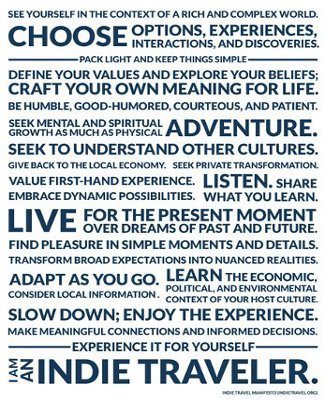
These values also speak to how we travel. We embrace the idea of visiting a country or city that is totally different from ours. We love learning about the culture in that new place. We strive to make connections while on the road, both with other travelers and the local people. And even if we do have to do some work while on the road, we do it passionately, and we certainly like spending our non-work hours doing what makes us happy.
While we talk about these passions daily and they come across in the content on our site and the services we offer, we wanted to take it a step further. Rolf Potts, author of Vagabonding and owner of this site, feels the same way about travel as we do. So he hooked up with our CEO and helped create the Indie Travel Manifesto.
This isn't a guide on how we think other people should travel. The tourist vs. traveler debate is a rather tired one, and we embrace the idea that everyone travels differently. This is how we travel. What are our priorities are as travelers. What we hope to get out of traveling – both domestically and abroad. We hoped that by putting our thoughts, ideals, and priorities onto paper, we would be able to create a manifesto that would have other like-minded travelers nodding your heads in unison.
We want to hear from you. We want your input on this. Read it. Vote up or vote down on the statements that you agree or disagree with. Comment on them. Share them with your social networks. And finally, if you agree with our assessment of indie travel, then go ahead and sign it. In the spirit of making meaningful connections, we hope to foster a community of travelers who love all the same things about travel that we love.
Original article can be found here: Introducing the Indie Travel Manifesto
February 4, 2012
Special February 2012 fares for multi-stop tickets on BootsnAll
Vagablogging :: Rolf Potts Vagabonding Blog
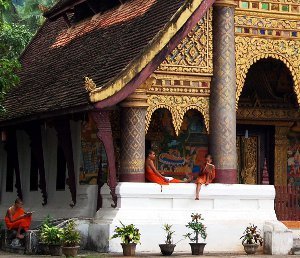 When planning a Round the World trip, there are loads of things to think about. Where to go, though, is usually tops on the list. There are always some destinations that are more popular than others when it comes to traveling long-term. They change with the times, of course, but one place that has been on the vagabonding radar for 40+ years is Southeast Asia.
When planning a Round the World trip, there are loads of things to think about. Where to go, though, is usually tops on the list. There are always some destinations that are more popular than others when it comes to traveling long-term. They change with the times, of course, but one place that has been on the vagabonding radar for 40+ years is Southeast Asia.
Sure, those headier-than-thou backpackers might proclaim Southeast Asia as an over-touristy locale, and yes, you will find plenty of tourists there. But there's a reason travelers keep flocking back. A few recent articles on BootsnAll's Round the World Wednesday series highlighted travel in the ever-popular region. Check out these 12 Reasons Why Southeast Asia is the Best Place in the World for Backpackers. If you're looking for practical advice – like highlights of each country and how to get around, then explore How to Plan an Extended Trip in Southeast Asia. The region really does have it all – from beaches to mountains to history to food – and all at rock bottom prices.
If you do decide to throw caution to the wind and travel the world, the first thing you'll want to look at is airfare. Your options are many, but be sure to keep your eye on different deals around the web. BootsnAll has monthly deals that can take you all over the world, including a few to places in Southeast Asia, so be sure to check out the following deals, which are good through February 29, 2012:
Equator-Hopper Circle Pacific Pro – Los Angeles – Rarotonga (Cook Islands) – Auckland – Sydney – OVERLAND – Cairns – Darwin – Bali (Denpasar) – Singapore – OVERLAND – Bangkok – Hong Kong – Los Angeles from $2629 plus taxes.
The Nomad – Los Angeles – Tokyo – Singapore – Kathmandu – OVERLAND – Delhi – Istanbul – London – OVERLAND – Paris – Los Angeles from $2399 plus taxes.
Goin' South – Miami – Guatemala City – San Jose (Costa Rica) – Lima – Bogota – Miami from $1245 plus taxes.
If you are looking for something a little different in your round the world trip, then start planning your trip of a lifetime with our RTW trip planner And don't forget to sign up for BootsnAll's RTW newsletter, delivering special deals, RTW trip planning advice, and resources via email every single month. We also have a Facebook fan page and Twitter page, so be sure to like and follow those to keep up to date on all your RTW travel needs.
Original article can be found here: Special February 2012 fares for multi-stop tickets on BootsnAll
February 3, 2012
How a world trip made a programmer's career
Vagablogging :: Rolf Potts Vagabonding Blog
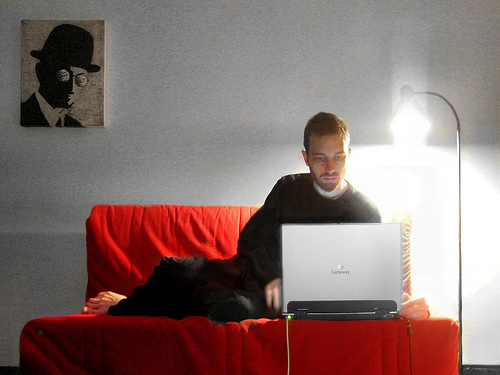
A man sitting on a couch and working at a laptop. Photo: hobvias sudoneighm / Flickr
Planning a round-the-world trip can seem as complicated as a space shuttle launch. There a million things to think about: plane tickets, visas, money, etc. The hard part is that everything seems important. Where to begin?
Alex MacCaw wrote a helpful, in-depth post titled, "How to travel around the world for a year." Although he's mainly talking to a Silicon Valley audience, his insights and practical advice would appeal to anyone.
What struck me about his post was that MacCaw's trip was actually a boost to his career. Anyone who's considered a career break has probably encountered some nay-sayers around the office. They often say things like, "It's a tough economy, better hold onto your job," "You're so close to getting a promotion!" "Don't throw away your career!" (Spoiler alert) By the end of the trip, MacCaw got a sweet job at Twitter.
How did the trip impact his employment prospects? One of the decisive benefits was that travel afforded him a lot of free time, a scarce commodity in today's fast-paced world. He wrote a programming book, did some coding for open-source projects, and joined e-mail lists of other developers that he met up with on the road. All of these things contributed to his resume.
On a personal note, reading that post reminded me of the many computer and tech professionals I've met around the world. There was one memorable occasion at a hostel in Hong Kong: every one of my roommates was either a university student majoring in computer science, or already working in information technology. That might have rubbed off of me, since I later became a Linux user and studied web design.
Do you work with computers? Do you work during your travels? Please share your stories in the comments.
Original article can be found here: How a world trip made a programmer's career
February 2, 2012
On being harrassed by touts and vagabonding travel
Vagablogging :: Rolf Potts Vagabonding Blog
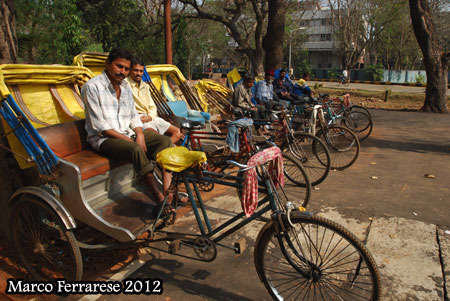
Rickshawallas on parade, ready to strike!!
"This is the place where the bodies are burnt. Women cannot access because a few times some of them have jumped over their husbands' pyres and died. If you see a white cloth, is a man. If you see a red sari, is a woman. I work here as a volunteer…"
A dramatic sight such as the Hindu traditional cremation on Varanasi's ghats becomes particularly otherworldly after dark, when the flames jut out of the pyres full of wicked energy, drizzling, as if dispersing pieces of soul little by little, bit by bit into thin air. This is a moment you want to enjoy slowly, privately, thinking of the secrets of life and death, reflecting on the differences between your own culture of the dead, and such a different one. You may want to cover your eyes as a log rolls slightly across the fire, revealing the nakedness of a burning limb… you may even have come a long way, just for this. Certainly not to be asked for cash.
The stuff of many travel legends is not something you are keen to share with everyone. Especially with that pestering local tout, aiming at you from a mile away, approaching fast. Ready to fire the same deadly tirade you do not want to hear. It happens everywhere, all over the world. In my case, the tout would not stop talking. Not even if you moved behind another foreigner, as if the vital was to talk for the sake of talking: "This is the place where the bodies are burnt. Women cannot access because a few times some of them have jumped over their husbands' pyres and died. If you see a white cloth, is a man. If you see a red sari, is a woman. I work here as a volunteer…"
Richard, a young New Yorker, has arrived in India after a trip to Europe. He is not green, having travelled the Northern half of the subcontinent for almost two months. He has another extended foray into Southeast Asia and Australia ahead and his face looks tired. "This country got me sick", he confesses.
We do not know each other, but we cannot help exchanging a sympathetic gaze, a tactical strategy to join forces and leave the bugger on the side. We have not even walked all the way up the ghat's first four steps that our "local friend" is already attacking a couple of elder tourists without even bothering to change the lines. His song is always the same:
"This is the place where the bodies are burnt. Women cannot access because a few times blah blah blah"
These days, and especially in South and Southeast Asia, touting has become a problem to cope daily with. It is legitimate to wonder whether or not travelling has to be off the beaten track to become free from such an annoyance.
My personal answer is: not really. Be it an offer for a guesthouse, a souvenir, one of those wooden frogs with a musical spine, a massage or a rickshaw ride, it appears that vagabonding may incur into a one-way only experience: the traveller's. Meeting someone who is genuinely interested in deepening the acquaintance is rarer and rarer, even further away from the main tourist sites. And most often, we misguide this pure contact for touting, and we are back to the start.
In this article, the author compiled a pop-song compilation of anti-sexual harassment feeling songs to keep in mind when a woman gets honed at during her travels. I think such an example may only foster the idea that something during the development of indie – and less indie – travel, has gone horribly wrong; because we, as travellers, are the first individuals to be responsible for the harassment.
Blame it on the hippy trailers or whoever you want, but as I've been taught "the lesser the demand, the lesser the offer". Turning back the history's time wheel is definitely not an option, but trying to become more responsible in our on the road choices definitely is. Otherwise, the risk we face is to transform the World into a depressing supermarket museum, and the travel experience into another kind of empty shopping cart we try to fill up to feel great and adventurous. These things, I am sorry, we cannot buy with a credit card.
PS: An acknowledgement to Richard's comments for having ignited the spark to write this week's contribution.
http://matadornetwork.com/life/a-soun...
Original article can be found here: On being harrassed by touts and vagabonding travel
Rolf Potts's Blog
- Rolf Potts's profile
- 323 followers


